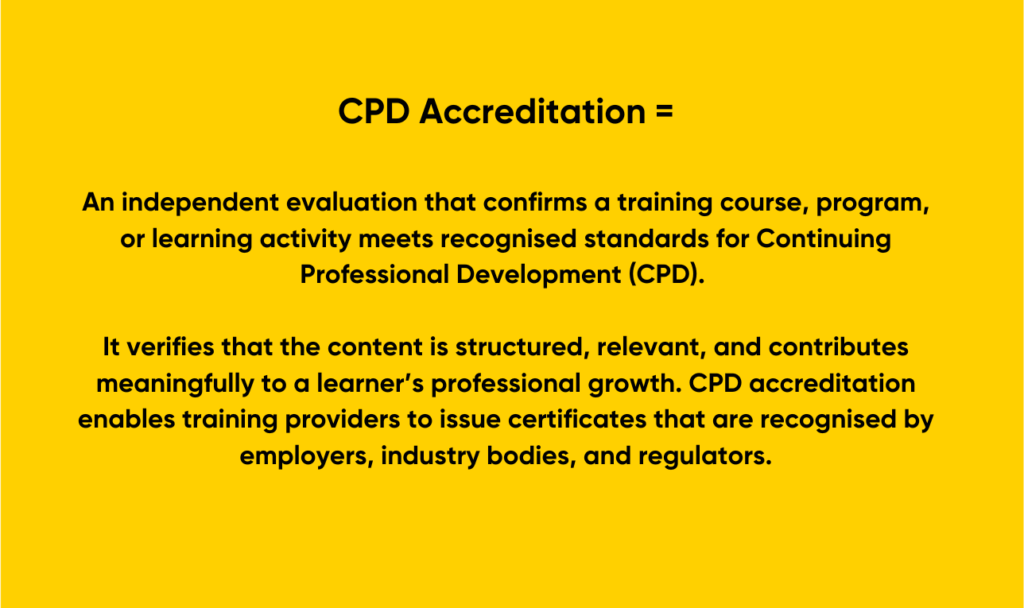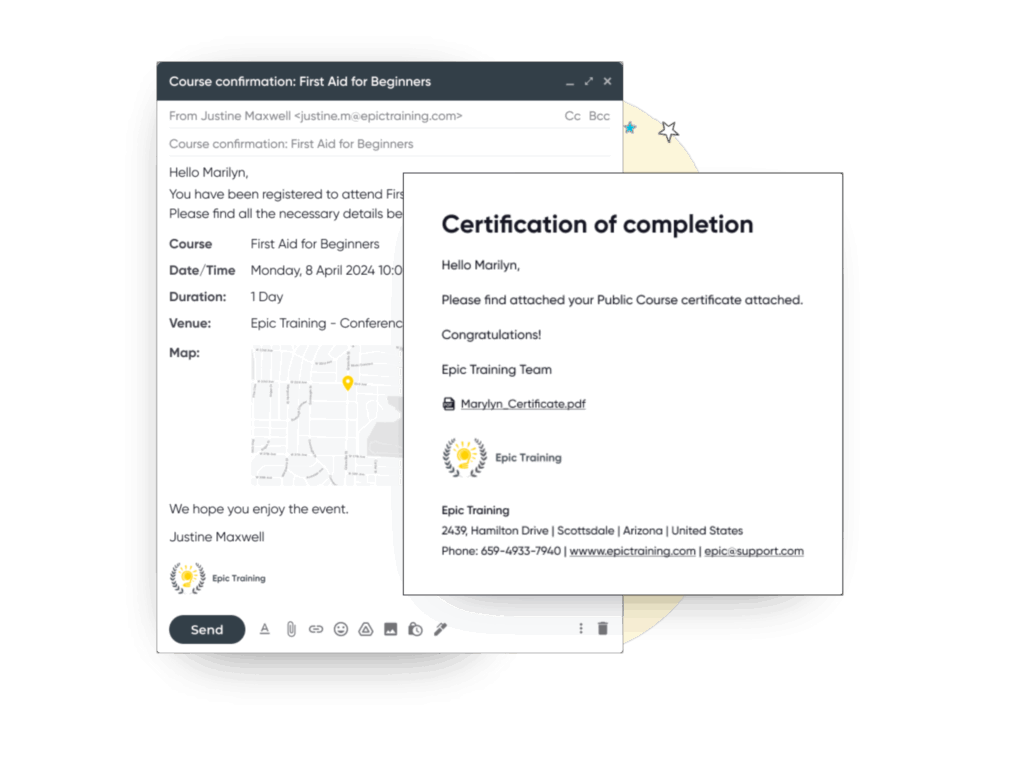Recently updated on August 4th, 2025
Continuing Professional Development (CPD) is now an expectation across most professions in the UK, from engineering and finance to social care and compliance roles.
Whether you’re delivering in-person workshops, online courses, or corporate training, becoming a CPD-accredited provider offers a powerful way to differentiate your services, improve learning quality, and attract clients who need recognised training.
In this guide, we’ll explain how UK training providers can become CPD accredited, what’s involved in the process, and how to manage ongoing requirements with the right operational tools.
What is a CPD Accreditation?
A CPD accreditation is an independent validation process that confirms that a training activity, such as course, seminar, workshop or online program, meets recognised standards for Continuing Professional Development.
The accreditation makes sure that the learning experience is structured, relevant and valuable for professional growth.
The key functions of CPD accreditation are:
- Independent Quality Assurance – An impartial body evaluates the structure and content of training materials to verify that they align with the CPD industry standards
- Recognition and Credibility – Accredited training signals quality and professionalism to learners, employers and industry bodies.
- Applicable Across Delivery Formats: CPD accreditation applies to a wide range of training formats, including in-person training, elearning, webinars, seminars and conferences.

What are the Benefits of CPD Accreditation for UK Training Providers
By becoming an accredited CPD provider, your training business can:
Offer certificates recognised by employers and regulators
Some of the biggest organisations in the UK are CPD accredited across a host of different industries.
According to one of the largest CPD accreditation organisations in the UK, the CPD Certification Service, orgs such as the NHS Confederation, the University of Oxford, the University of St Andrews Business School and more.
CPD accreditation allows you to issue certificates that are widely recognised by employers, regulators, and professional bodies.
Demonstrate professionalism and instructional quality
CPD accreditation confirms that your training has been independently assessed for relevance, structure, and measurable learning outcomes – all key core indicators of instructional quality.
It also shows that your courses meet a recognised professional standard, which reassures clients and sets you apart from unaccredited providers.
According to the CPD standards office in their 2023-2024 white paper ‘CPD Research Project’, 75% of training delegates report gaining valuable knowledge, and 67% say they develop new skills through CPD-certified training, highlighting the tangible learning outcomes that accredited courses consistently deliver.
Attract clients who expect verified quality
CPD accredited acts as a trust signal for corporate buyers, especially in regulated industries where compliance and audit trails matter.
In the CPD Research Project paper we referenced above, 90% of professionals surveyed stated that CPD played an important role in their career progressions, making it clear that learners and employers alike value, format, and certified development opportunities.
Build courses that actually deliver learning value
Getting a CPD accreditation requires your training to demonstrate clear outcomes, structured content and relevance.
And the stats show this in the feedback from learners, alongside 90% of learners saying CPD played an important role in their career progression, 75% of CPD training delegates in the same survey say that CPD courses helped them gain knowledge, while 67% reported learning new skills.
What Types of Training Can Be CPD Accredited?
Almost any structured learning activity can be submitted for CPD approval. This includes:
- Instructor-led training courses
- Seminars and workshops
- Online courses and webinars
- Conferences and in-house sessions
- Hybrid or blended learning programs
These can span industries including agriculture, construction, finance, healthcare, and beyond.
How to Become a CPD-Accredited Training Provider (Step-by-Step)
Each CPD accreditor follows a slightly different process. For example, UK-based Advantage Accreditation outlines the following steps on their website, for how they accredit a training provider:
Step 1. Get accredited as a training centre
Before you can accredit a course, you must first become an approved training centre. This involves submitting an application that details your organisation’s facilities, trainer qualifications, and ability to deliver structured learning in a safe environment.
Your application is assessed against set criteria, and once approved you can move onto course-level accreditation.
Step 2. CPD Course Approval
Once your centre is registered, you submit your training courses for approval. At this stage, the following is reviewed:
- Course structure
- Learning objectives
- Materials
- The courses relevance to professional development
Course content is expected to be well organised, error free, and delivered using effective teaching methods.
Step 3: Trainer Approval
Not all accreditation providers require your trainers to get accredited, but Advantage Accreditation, requires trainers to demonstrate subject matter expertise and appropriate teaching qualifications.
The approval process involves reviewing CVs, experience, and evidence of instructional capability. If a trainer is lacking a qualification or the needed experience, guidance is provided to help trainers meet the required standards.
Step 4: Certification and CPD Credits
Once courses and trainers are approved you can begin delivery. Courses are awarded CPD credits based on active learning time.
Learners receive dual-branded certificates with both the training providers logo and the accreditation companies kitemark, showing the training meets externally verified standards.
Step 5: Ongoing Requirements and Support for CPD Providers
Accreditation isn’t a ‘one and done’ process. Training providers must maintain:
- Up to date course content with clear learning outcomes
- Attendance tracking and learner records
- Certificate Management to issue valid CPD statements
- Renewal of membership and resubmission of new or updated courses.
Accreditation providers often provide continued access to their online portal, where training providers can manage courses, issue certificates and track learner progress.
Related Read: How Arlo Training Management Software is Powering Training Providers in the UK and Ireland
Choosing a CPD Accreditation Body
There is no single governing body for CPD accreditations in the UK. Instead, several independent organisations provide accreditation services, each with their own framework, processes and pricing.
Some of the most well known CPD accreditation bodies in the UK include:
The CPD Certification Service (cpd.co.uk): One of the largest and longest running CPD accreditors in the UK, working with organisation across every major sector, from healthcare to finance
The CPD Standards Office (CPDSO) Operating since 2012, the CPDSO has accredited more than 700,000 courses globally.
The CPD Group (thecpd.group) is a UK based accreditor with an approved provider network of over 9,900 organisations.
What to consider when choosing an accreditation body:
Before applying for CPD accreditation, its important to evaluate how well each accreditor aligns with your organisations goals, delivery method, and audience, While most follow similar core principles, there are key differences in structure and support:
Industry recognition
Some accreditation bodies are better known in certain industries than others. It’s worth researching which accreditors are recognised or preferred within the professional sectors you serve.
Directory listings
Consider whether the accreditor includes your organisation and courses in a public directory. A searchable listing can help improve discoverability and give potential clients a chance to verify your status directly.
Support and guidance
Look at what onboarding, templates, or guidance are provided to help you through the application process. Some accreditors offer support contacts, communities or marketing resources to help you with your training business
Pricing model
Accreditation costs can vary. Some accreditors charge an annual provider fee and additional fees per course submitted, while others may provide free provider approval with pay-as-you-go pricing for individual activities. You’ll need to assess the full cost based on the number of courses you plan to accredit.
Additional services
Accreditors may also offer extra options, such as trainer or coach accreditation. This can be useful if you’re looking to upskill your instructors, or you are an instructor looking to grow their professional expertise.

Manage your training business with a TMS
Find out more about what a training management system is and how it can help you run your training business
How much does it cost to get accredited?
There’s no one set fee to get accredited. Each organisation has its own fee structure, but most follow the model of combining annual membership with per-course assessment charges.
Generally, you’ll pay an annual fee to gain accredited status, which grants access to the accreditor’s systems, support services, and the ability to submit courses for approval.
Most accreditors will also charge an additional fee each time a new course is submitted for formal assessment.
These per-course costs may vary depending on the format, length, or complexity of the learning you’re delivering. For example, a one hour webinar may be priced differently from a multi-day face to face course.
Other additional charges that you may come across depending on the provider, are:
- Marketing packages to promote your courses
- Licence fees to use their logo on course materials and certificates
- Branded certificate templates to send learners after they complete a course.
How long does the process take?
The accreditation process for most training providers is relatively straightforward. Registering typically takes one to two weeks, depending on how quickly you complete the submission forms and provide the necessary documentation.
Once your organisation has been accepted, you’ll be invited to submit individual training activities, such as your courses, workshops or webinars for assessment.
The course review processes can vary based on the number of courses you submit, the quality of the materials, and the accreditor’s internal review process.
It’s worth noting that you don’t need to get all your courses accredited at once, many providers start with one of two, and then submit additional courses in phases.
How a TMS Can Help Manage CPD Delivery and Compliance
Becoming CPD accredited is one part of the equation. But to deliver high-quality training at scale, providers need the right operational tools in place, which is where a training management system like Arlo comes into play.

For any training organisation delivering multiple courses each month, or that needs to coordinate large teams of trainers and venues, relying on spreadsheets and manual processes isn’t sustainable.

Arlo brings every part of the training delivery process into one connected system.
You can build reusable course templates to avoid repetitive set up work, assign presenters and venues with built in training and course scheduling tools that automatically flag conflicts, and track attendance
Once you’ve published a course, the details are instantly updated across your website – no need for duplicate data entry. Registrations and payments are handled online, with flexible checkout options and custom forms to capture the exact information you need.

Arlo also automates the admin that typically eats into your team’s time. Booking confirmations, invoices and calendar invites, and course instructions are sent out automatically.
Certificates are generated based on attendance or assessment results, and learners can access everything they need through a self-service portal, which eliminates the need for lost certificates or outstanding payments.

Every registration updates the built-in training provider CRM, so you have accurate contact and organisation records for reporting and future engagement.
Whichever type of training you are delivering Arlo helps you deliver a consistent, professional training experience, and the tools you need to scale.
If you want to try Arlo #1 training management software for CPD providers, get started below 👇